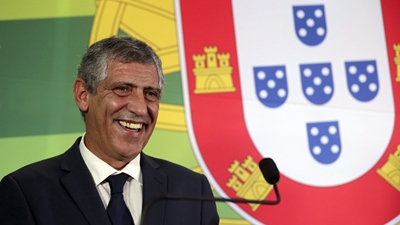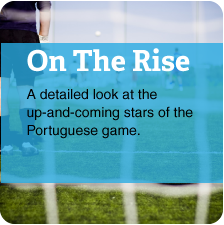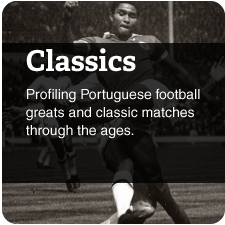Evaluating Fernando Santos' new-look Seleção
Having reached the conclusion of the 2014 international football season (at least in Europe), Seleção fans everywhere will have no doubt prepared their individual critiques of a year of football that flattered to deceive.
From the disappointment in Brazil to the rather inauspicious beginnings of Euro 2016 qualifying it was a difficult year to be a fan of the Portuguese national team in many respects. Nevertheless, from the shadows of underachievement has risen a new era in Portuguese football. Paulo Bento is gone and Fernando Santos' reign has begun. But change should not be, I would argue, the greatest imperative. Change can also be bad.
In these situations it can be illuminating to compare the qualities of our current squad with those of the era that preceded it lest we repeat their mistakes and thus subject ourselves to further calamity. Additionally, I'll point out some of the positive and negative signs from the last few matches and what that means for the future, whether it be Euro 2016 glory, or something altogether less inspiring.
Changing of the guard
Few Seleção fans would argue that Bento's time had passed when he was released from duty at the end of September. Having been beaten at home by Albania, the FPF were finally compelled to take a long hard look at the monotony that had become Bento's tactics and squad selections. Fernando Santos certainly made some changes to the squad, but the question we must ask ourselves is "where will these changes take us in the long term?" I'm not just focusing on the next match. I'm thinking about France in 2016, and beyond. Is Santos getting us any closer to our first major championship than Paulo Bento did? Let's consider some of the evidence.
One cannot fail to recognize that in each of the last four matches, Portugal's scoring threat has been relatively subdued. Unlike Paulo Bento, Santos has adopted a strategy used by Carlos Queiroz to utilize Ronaldo as the number nine. Though Ronaldo has already found the net as many times (2) under Santos as he did during the whole of Queiroz's tenure, the Portugal captain's influence on proceedings has been noticeably diminished. Interestingly, it's been at the end of matches when Ronaldo is pushed back to the wing and a true striker is introduced (usually Éder) that Portugal have made a breakthrough.
Few would argue that Portugal desperately need a better number nine, and Santos, like Quieroz before him, has sought to address this issue with Ronaldo only to discover that this method is simply not effective. No matter how many times a manager tries to cram the proverbial round peg into a square hole, it's an unavoidable truth that Ronaldo cannot be used to the utmost of his extravagant ability when isolated at the top of an offensive trident in Portugal's 4-3-3. In truth, the conundrum of who to play at number nine will go on, regardless of Portugal's manager, until a player of sufficient quality emerges to take ownership of that position.
Santos has also separated himself from Bento by instilling a renewed commtiment to defence which has played a vital role in securing three 1-0 victories in a row. This could not have been done without key personnel changes, including young Raphael Guerreiro. Furthermore, the dogged tenacity and experience of older players like Tiago and Ricardo Carvalho has also paid dividends. The concern I have with this strategy, of course, is the end game. Will these veterans be able to compete on the same level at Euro 2016 against the best national teams in the world?
It's inevitable that Portugal will one day have to turn over many of its key positions to the next generation. The real concern I have with Santos after his first four matches is whether or not he is willing to tolerate the inherent risk of incorporating Portugal's youth into the senior team. Sound familiar? It should, Bento suffered from the same condition, most recently (and frustratingly) for his reluctance to trust William Carvalho in central midfield during the World Cup. This "condition", the reluctance to implement major turnover in the squad, is going to eventually create a situation where we won't be able to compete with younger, fitter teams in major tournaments. It also stalls the development of the young players themselves. Guerreiro's success at fullback has shown that while adding new blood can be a gamble, the rewards can more than justify that risk. Santos must differentiate himself from the obstinance of Bento's era and gradually refurbish this squad if there is to be any real hope of being competitive in 2016
I'd also like to add that this in no way means that I have personal grievances against players like Carvalho and Tiago, but their inclusion in the starting eleven seems to be a decision that can only really benefit the team in the short term (i.e. in qualifying) while it may cost us dearly in the long term when it matters most (at Euro 2016 itself). Santos has done well to release some of the underperformers such as Hugo Almeida, Meireles, Veloso, and João Pereira, but he must be mindful not to fall back on a generation that has already had its chance at glory.
Positive signs
Rather than focus solely on the shortcomings of Santos' first four games in charge, it's important to recognize the defensive stability that Portugal's manager is obviously trying to implement. Championship sides are built from the back. If you look at past winners of the World Cup and European Championships it won't take long to recognize that each of them had rock solid defensive records. Having a good defence gives a team the opportunity to win even the ugliest of matches, and it could be argued that Portugal have been "winning ugly" quite a bit lately. But this isn't necessarily a bad sign. In fact, teams that can win ugly matches, especially matches in which they've been outplayed, demonstrate their psychological resolve and commitment to a never-say-die attitude that hasn't always been characteristic of the Seleção.
Many gloss over the significance of Portugal's win against Denmark in the dreary rain of Copenhagen. This was a match that could have gone either way, and many would say that a draw would have been the more fair result. But Ronaldo's headed goal in the last seconds of stoppage time was, I believe, just reward for the strength that the Seleção showed in fighting the Danes in the rain, mud, and hostile atmosphere of a stadium that has proven to be a difficult venue for Portugal. The result against Argentina was arguably even more impressive given the way the South Americans controlled the tempo of the game. At times the Seleção were overrun, and even though that is somewhat worrying it must be recognized that Portugal held off one of the best offenses in world football, and went on to steal a winner with its only shot on goal in the entire match. That kind of ruthless efficiency is very unlike previous versions of this team which have often peppered opposition goalkeepers only to come up empty handed.
The match against Armenia was an even more clear indicator of progress in terms of how this team plays against lesser quality opponents. Just a few months ago against Albania, Portugal were without answers for the defensive-minded, counterattacking approach that eventually led to one of the more shocking results of this Euro 2016 qualifying campaign. Not so against Armenia, and despite allowing the visitors a host of chances, the team never lost its nerve or desire to press the issue against technically inferior opposition. Ronaldo's scrappy goal was again just reward for a team that showed it now has an answer to those lesser quality opponents that employ negative tactics.
Results, I would argue, should always be the ultimate measure of a manager's strategic ambitions. Whichever direction Santos leads this team must always be justified by the end product on the field. So far, in spite of the concerns I may have, the results are indisputable, and Santos has established a gameplan that has been effective against both the minnows (Armenia) and the juggernauts (Argentina) alike.
Breaking the habit
The last subject I'd like to discuss is the need to break away from what I believe is becoming a bad habit for this squad. For some reason, as Cristiano Ronaldo's influence has grown, the rest of the team seems to fade. The better Ronaldo plays, the more incompetent players like Danny, Nani, Moutinho and others become. There are obviously some exceptions to this rule, such as against Sweden last year, but for the most part the Seleção have evolved into "Ronaldo and his merry band of men" where Ronaldo always plays the hero as the squad underachieves. Many have blamed Ronaldo for this zero sum game into which Portugal has fallen. But I disagree, and would suggest that each individual of Ronaldo's supporting cast has to take responsibility for their own level of play regardless of how CR7 performs.
Ronaldo will likely remain the most skillful player on this team until he retires, but that doesn't give the other players an excuse to rest their laurels on his achievement, which I think is what's really happening. The squad seems to have an expectation of Ronaldo that he will bail them out of whatever trouble they get themselves into. Even though Ronaldo has often put on his hero's cape to save Portugal, I think most would concede that this strategy is not going to be successful in the long term. One of the hallmarks of a great team is one that understands how to use its best talents, but never to the abandonment of basic team principles upon which all championship sides are built. It's ultimately a problem of individual ambition and Santos will have to solve this growing dilemma too if Portugal are to be successful during his tenure.
During this rebuilding phase, it's easy to become apprehensive about every imperfection or poor result. But the template for success is under construction and Santos has at his disposal some incredible up-and-coming talents that, combined with Ronaldo's paranormal ability and a strengthened defense, could lead Portugal to heights yet unattained.
by Nathan Motz





